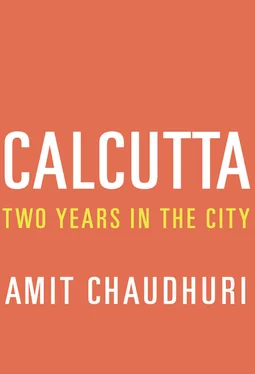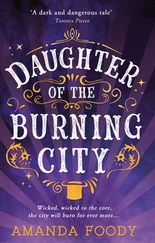On our first visits, my wife and I noticed that Mrs. Mukherjee Senior said “thet” for “that,” “beck” for “back.” It was a late Victorian pronunciation of English words, and should have survived, at most, to the forties. Samirda’s mother must have picked it up in school, and she was quite unselfconscious about her distinctive approach to vowels. My wife, secretly, was startled into remembering her grandmother — her father’s mother — whenever Mrs. Mukherjee spoke; she was tickled (there’s no other word for it) at this return, without warning, of what she thought was a bizarre and unique part of her ancestry. Her grandmother had died three years ago of cancer. R waited till the next meeting before asking Mrs. Mukherjee (who always stooped forward slightly and clasped our hands when we said hello to her): “Did you know my grandmother Anila Bose by any chance? You speak so much like her”—as if mere diction might open a doorway onto a once-known world. “Bhona!” exclaimed Mrs. Mukherjee — almost all Bengali pet names are supposed to be embarrassing, and my wife’s grandmother’s was no exception—“Of course I know her! I was her junior by a few years at Loreto! Why, this is wonderful!” The Mukherjees, as a family, had a way of making emphatic, jubilant assertions; and it was now my turn to watch as they went into a huddle with R.
Samirda’s lineage was what was once derisively called “Ingabanga.” So was my wife’s father’s maternal line. Bhona played tennis, knew which knife and fork to use during the various stages of dinner, was aware that the knife and fork must meet in perpendicular unison on a plate to indicate a meal was finished, and called the coconut-flavoured, sugar-coated tea biscuit “nees,” where ordinary people said “nice.”
The Ingabanga was a mutant produced by British rule and by aspiration — an obsessive desire to approximate and reproduce Englishness. This is not to say that the Ingabanga — or Anglo-Bengali; predecessor of the “wog” and of the “coconut” (brown outside, white within) — was Westernised, while the dhutipanjabi-wearing bhadralok was pure and native. In fact, the latter was deeply cosmopolitan; even European, in some ways. He would have probably learnt English as a second language; but that didn’t impede the bhadralok’s intimacy with the West. While the bhadralok might know Milton and Marx as well as he knew the novels of Bankimchandra Chatterjee, he might not — unlike the Ingabanga — pronounce English words perfectly, or be conscious of the difference between Camembert and Stilton, or have tasted asparagus. One of the joys of Anitadi’s teas was listening to the conversation, mainly because of how beautifully the Mukherjees spoke English: it lost its Anglo-Saxon consonantal hardness, and became a liquid murmur in their mouths. Tagore wasn’t Ingabanga: he lamented, often histrionically, his lack of command over the language, exaggerating, deliberately, his deficiency — a calculated and inverse showing off. He was actually very well-read in English literature. But he did confess, as I said earlier, to not being able to distinguish between the pronunciation of “warm” and “worm”: a common Bengali conundrum. An Ingabanga wouldn’t have that problem. Still, simply being an Anglophile didn’t ensure you were Ingabanga. For instance, Nirad C. Chaudhuri, who dedicated his first book to the memory of the British Empire, was an East Bengali provincial raised in a small town; he had an extraordinary breadth of reading and was a master of English prose style, but had learnt English as a second language. That he took to wearing a bowler hat and a suit after moving late in life to Oxford, or interrogated his often famous guests about wine and Mozart, couldn’t change him from being an eccentric Bengali Anglophile into an Ingabanga: nor would he have wanted to be one. For the Ingabanga was a person of privilege, yes, but also caricatured as a slightly fatuous servant of the British: the member of a disliked minority in Bengal that had surrendered to the English way, of which the observance of table manners was just a symptom.
By the time we met the Mukherjees, the exacerbations caused by Empire and the British were distant enough for us not to mind too much whatever remained of that age, in whatever form — even anecdote, or tea and sandwiches. In fact, in the 1990s, privileged pasts, with a sort of fin-de-siècle energy, were making a comeback. This energy coincided with the advent of globalisation and economic liberalisation, and with the end of the Nehruvian era, with its various self-imposed austerities and hypocrisies. People — some of whom even claimed to have socialist leanings — said they were descended from maharajahs, although titles and their hereditary privileges had been emphatically rescinded by Indira Gandhi: one of her few near-autocratic gestures that had a moral rightness to it.
In the nineties, though, almost every upper-class person boasted of having a familial connection with either a maharajah or a governor, or a legendary name in the freedom struggle; in Bengal, people disclosed how they were distantly related to some iconic figure in the Bengal Renaissance, or to a colonial aristocracy that counted Sir and Lady So-and-So among its members. India, under the new free-market dispensation, was having to manufacture a new elite, and shamelessly plunder, recoup, and excavate the old elite while doing so. So, not only was the maharajah, with his turban and tiger skin on the floor before him, returning from the dead, but, in Calcutta, the Ingabanga too.
The irony, of course, was that Samirda was genuinely the progeny of an old elite that was petering out.
Having grown up in Bombay, with the sort of parents I had, I knew almost nothing of the importance of family connections. I couldn’t say I was related to a celebrated figure or household, and didn’t spend too much time wondering about these things; maybe, in the seventies, this was still not a way of conceiving of your place in the world.
Besides, I am an only child, and so is my father; I lived with my parents in a luxurious island of self-sufficiency. “Family”—especially my mother’s family — was synonymous to me with the faraway (since many of my uncles had settled in small towns after Partition), with whatever was different from ourselves, and with being a seedbed for human foible. I knew my uncles, my mother, my aunt, were gifted, and that I might have inherited a bit of whatever little talent I had from them; but those uncles were great time-wasters too, and could spend an entire morning expending a great deal of emotion and even reasoning deciding which was the better fruit, the mango or the custard apple, the more melodious singer, K. L. Saigal or Sachin Deb Burman. So I came to believe, perhaps mistakenly, that families were not distinguished by their connection to history, but that they were a counterpoint to it; that history paled into dullness in comparison with the strangeness of family.
* * *
“Aristocracy — tell us another!” says Bassani’s narrator of the last patriarch of the Finzi-Continis, Professor Ermanno, and his wife, Signora Olga. “Instead of giving themselves such airs, they’d have done much better, the both of them, not to forget who they were, and where they came from, if we’re to believe that the Jews — Sephardic and Ashkenazi, Western and Levantine, Tunisian, Berber, Yemenite and even Ethiopian — in whatever part of the world, under whatever skies history has scattered them, are and will always be Jews, which is to say close relatives.” The narrator, who’s in love with the young daughter of the family, is reminding us, with bitter irony, that, at a certain point in history, no Jew, whatever their hubris about pedigree and wealth, could escape the disgrace of who they were. Rich Jew and poor, dark and fair, were part of a single unhappy family.
Читать дальше












